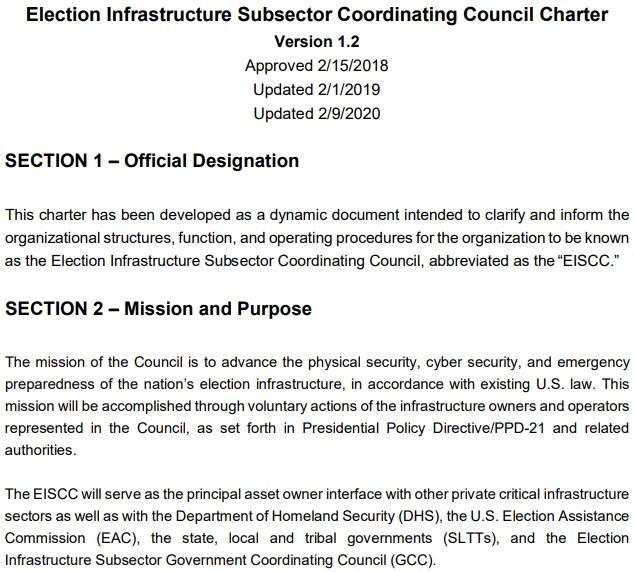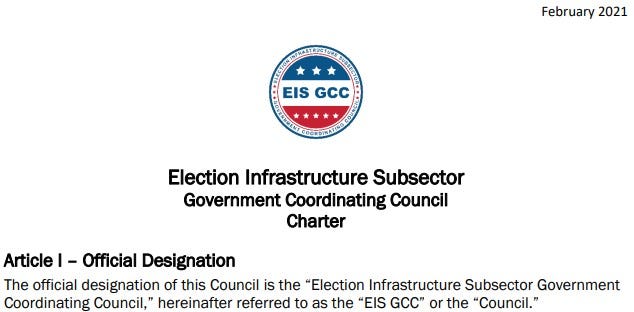Election Infrastructure Corruption - Shorter Version of Devolution Part 5
Cybersecurity Infrastructure Security Agency & Dominion
Critical Infrastructure
In 2003, President George W. Bush signed the Homeland Security Presidential Directive 7 (HSPD-7) which called for the creation of the National Infrastructure Protection Plan (NIPP). The NIPP created partnerships between Government Coordinating Councils (GCC) from the public sector and Sector Coordinating Councils (SCC) from the private sector with a goal of ensuring resiliency by protecting critical infrastructure and key resources. The NIPP also mentions “Advisory Councils” shown below. These councils are the method used to involve the private sector in matters of national security relating to critical infrastructure.
Remember that highlighted part. The formation of this Critical Infrastructure Partnership Advisory Council (CIPAC) as FACA-exempt is crucial and I’ll explain why later. One more thing regarding membership of CIPAC that will come up again later:
Cybersecurity and Infrastructure Security Agency
On January 6th, 2017, Secretary of Homeland Security Jeh Johnson (Obama’s SHS) released a statement designating “Election Infrastructure” as a “critical infrastructure subsector” within the existing critical infrastructure sector titled: “Government Facilities”. This allowed Election Infrastructure Security to fall under the umbrella of the DHS.
On November 16, 2018, President Trump signed into law the Cybersecurity and Infrastructure Security Agency Act of 2018 which established the Cybersecurity and Infrastructure Security Agency (CISA). According to their own website, “The Cybersecurity and Infrastructure Security Agency (CISA) is the Nation’s risk advisor, working with partners to defend against today’s threats and collaborating to build more secure and resilient infrastructure for the future.” The CISA website lists all 16 of the critical infrastructure sectors but I want to focus on the Government Facilities Sector because that is where you can find the Election Infrastructure Subsector. The election infrastructure subsector landing page looks like this:
Here is the 2020 Charter Election Infrastructure Subsector Government Coordinating Council Charter-2-9-2020 as shown above. Keep in mind that Sector Coordinating Councils(SCC) are from the private sector and are members of Critical Infrastructure Partnership Advisory Council (CIPAC).
Essentially, the EISCC is a council made up of members from the private sector that advises and assists our government with the “physical security, cyber security, and emergency preparedness of the nations election infrastructure”. They do this through “voluntary actions of the infrastructure owners and operators REPRESENTED in the council”.
This means that the members of the EISCC are the actual election infrastructure owners and operators, and they handle the physical security along with the cybersecurity through their own “voluntary actions”.
They “coordinate with the DHS to develop, recommend, and review sector-wide plans, procedures, and effective practices in support of infrastructure protection, including training, education, and implementation”. They also “make recommendations to appropriate authorities to mitigate impediments to effective critical infrastructure security”.
Section 5 of the charter is critical. Focus on the first paragraph below. “The EISCC operates under the critical infrastructure partnership advisory council (CIPAC) framework established by the Secretary of Homeland Security pursuant to section 871 of the Homeland Security Act of 2002 (6 U.S.C. §451)”
What exactly is “section 871 of the Homeland Security Act of 2002 (6 U.S.C. §451)” I’m going to break this down the best I can.
So the EISCC which we know operates under the CIPAC framework is exempt from Public Law 92-463 (screenshot below) and that law establishes “a system governing the creation and OPERATION of advisory committees.”
So just to make sure this is clear:
DHS has submitted a notice in the federal registry in 2006 (renewed every two years) that CIPAC is exempt from oversight over its creation and operation of advisory committees
The EISCC is operating under the framework of CIPAC.
Therefore, the EISCC is exempt from oversight over its creation and operation.
Now Back to Section 871 (just read the highlighted part):
Here is the section 202 of title 18, USC (most important parts highlighted):
So because the EISCC operates under the framework of CIPAC and is exempt from Public Law 92-463, they are classified as “Special Government Employees”.
Back to Section 871 (just read the highlighted part):
Subsection b(3) of section 208 of Title 18, United States code reads as follows:
So because the EISCC operates under the framework of CIPAC and is exempt from Public Law 92-463 (exempt from oversight), they are classified as “Special Government Employees” and they have been certified that their “services outweighs the potential for a conflict of interest created by the financial interest involved.”
This means our government knows there is a “potential for a conflict of interest created by the financial interest involved” for members of the EISCC because the “official responsible for the employee’s appointment” has to certify it. They know there is a conflict of interest for members of the EISCC yet they allow it to operate without oversight.
Why is this so important? Scroll down and check out the member affiliations of the Election Infrastructure Subsector Coordinating Council’s 2020 Charter. Try not to shit your pants.
Dominion Voting Systems and Smartmatic were two of the members of the EISCC which “advises and assists” our government with election security by “coordinating with the DHS to develop, recommend, and review sector-wide plans, procedures, and effective practices in support of infrastructure protection, including training, education, and implementation”. They were also making “recommendations to appropriate authorities to mitigate impediments to effective critical infrastructure security”. Read again the EISCC Mission and Purpose.
Our Government knew there was a conflict of interest because they had to sign a waiver certifying they knew. Yet, the members of the EISCC who were the very companies used for basically every aspect of the 2020 election (machines, ballot printing, etc.) were also in charge of the “physical security, cyber security, and emergency preparedness of the nation’s election infrastructure” and they HAD NO OVERSIGHT.
I’m sure other companies here could be flagged, but Dominion and Smartmatic are my focus because they have been in the spotlight of the 2020 election fraud. If you haven’t yet, read this article from the Epoch Times showing A History of Foreign Ties Behind Voting Machines Used in US.
This revelation sheds new light on this statement from CISA which was released on November 12, 2020. Dominion Voting Systems and Smartmatic, the very companies accused of committing fraud in this election, we’re part of the election infrastructure joint statement claiming “the November 3rd election was the most secure in American history.”
On November 30th, 2020, the Department of Homeland Security renewed the charter again for two more years and with that renewal came the straw that broke the election fraud’s back. If you go back to the main Election Infrastructure Subsector: Charters and Membership landing page and click on the link for the 2021 version of the charter which was released in February, you’ll notice something different.
They changed the name from “Election Infrastructure Subsector Coordinating Council” (EISCC) to “Election Infrastructure Subsector Government Coordinating Council” (EIS GCC). It now reads that “EIS GCC membership is composed of government agencies and organizations representing government officials that own, operate, or administer subsector physical or cyber assets, systems, and processes or have responsibility for supporting security and resilience of those assets, systems, and processes.”
No mention of Dominion or Smartmatic. No mention of the private sector companies from 2020 at all.
Can you say cover-up? Where is congress asking questions about this?
Patel Patriot
Tip jar: https://paypal.me/PatelPatriot?locale.x=en_US.
This was the shorter version of my Devolution - Part 5, the full version can be found at the link below.
If you haven’t read the previous installments of my Devolution series, you can do here:
Devolution - Part 1 - by Patel Patriot
Devolution - Part 2 - by Patel Patriot
Devolution - Part 3 - by Patel Patriot
Devolution - Part 4 - by Patel Patriot
Devolution - Part 5 - by Patel Patriot
If you have any questions or would just like to engage in some Devolution talk, feel free to email me or join my telegram and ask away: https://t.me/patelpatriotchat and don’t forget to Subscribe!






















https://dod.defense.gov/Portals/1/Documents/pubs/DoD%20Law%20of%20War%20Manual%20-%20June%202015%20Updated%20Dec%202016.pdf?ver=2016-12-13-172036-190
Trump is the Sovereign power, China / Biden the occupying power
The military has the duty to remove the occupying force
DoD Law of War
Manual - June 2015 Updated
https://karen-early.com/current-events/dod-law-of-war-manual/
go to page 754 shortcut!
https://rumble.com/vivmij--law-of-war-the-storm-series-3-military-tribunals-28-proofs-new-remade-new-.html
"Fraud vitiates everything." That enduring opinion was the crux of the landmark decision handed down by the U.S. Supreme Court in the above referenced case of the United States versus Throckmorton. Ipso facto, the outcome of a POTUS election that is rife with one-sided fraud and criminality is rendered null and void.
754-755 XI– Military Occupation Chapter
755 the interests and welfare of the civilian population of the occupied territory.2 The Occupying Power has obligations related to the maintenance of public order and safety, and the protection of civilians and property in occupied territory.3Military Occupation – Notes on Terminology. 11.1.111.1.1.1Military Occupation, Military Government, Belligerent Occupation, and Martial Law. The practice of conducting military occupation is very old, and the law of military occupation has long been part of the law of war.4 Military occupation is also called belligerent occupation. The conduct of military occupation has also been characterized as an exercise of “military government”5 or “martial law
https://www.bitchute.com/channel/majic_eyes_qnly/FB